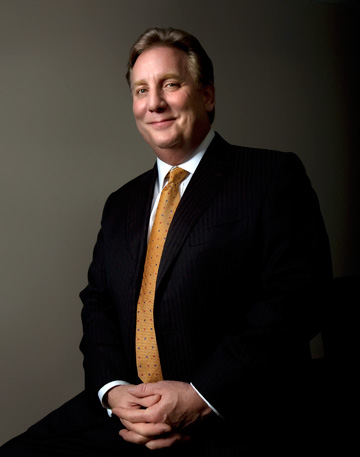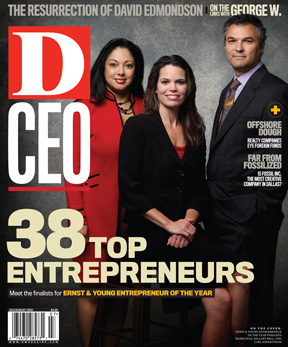Mobile phones have changed our lives in immeasurable ways. But for all the good they do, they have become an environmental nuisance. Cell phones, with their toxic batteries, precious metals, and tiny circuit boards, are piling up in landfills—and the pile only gets larger every year.
Former RadioShack CEO David Edmondson is aiming to stem the tide of cell phone waste. Edmondson, now CEO of Irving-based eRecyclingCorps, is out to convince the world’s largest mobile service providers that his firm’s trade-in system will make their customers happier while keeping the discarded phones from ending up in the garbage.
Big Trouble
About four years ago, Edmondson wasn’t worried about e-waste. He was sitting on a beach in France, trying to outrun the series of events that took him down only nine months after he became a Fortune 500 CEO.
“When you spend 25 years of your life working to get to a particular place in your career and then you find your career imploding, that can be very debilitating,” Edmondson says.
That implosion was legendary. In February 2006, Edmondson resigned as RadioShack’s CEO amid a scandal caused by discrepancies in the bio on the company’s website, the materials RadioShack distributed to the press, and the interviews Edmondson gave to reporters.
“The contents of my résumé and the company’s website were clearly incorrect,” Edmondson said in a 2006 media statement. The problem, as first reported by the Fort Worth Star-Telegram, was that RadioShack’s press materials claimed that Edmondson had a degree he couldn’t produce or otherwise prove he had earned.
The degree scandal had been kicked off because the Star-Telegram was following up on a tip that Edmondson, a former Baptist minister, was facing trial following his third arrest on drunken driving charges.
“I made a mistake,” Edmondson tells D CEO. “I made a mistake getting behind the wheel after having any alcohol. Period. It was a very valuable lesson in judgment.” He says he hasn’t been arrested since he left RadioShack.
Edmondson sums up his résumé scandal as “a series of events that were extremely unfortunate.” He maintains that he didn’t intend to contort the facts and mislead anyone. But he didn’t act quickly enough to correct the record.
“The mistake that I made was not monitoring my image,” he says. “When you’re the CEO of a company, what you do and how you live affects many, many people’s lives. A leader has to add enormous value to an organization. And when you come to a point where you can no longer do that, then you need to go find a different place to lead because too many people get hurt.”
Reboot And Bootstrap
Edmondson came back from his French vacation to bootstrap EasySale Inc., a consignment business that caters to folks who need to have a garage sale, but are just too busy. “There are many people out there paying $150 to these storage units every month to store $1,000 worth of stuff,” he observes.
The idea is novel: EasySale picks up unwanted items from homes or businesses and documents and lists the items for sale online. When items are sold, the company collects payments, handles shipping, takes a commission, and sends the item’s original owner a check for 60 percent of the selling price.
What isn’t lost on Edmondson, still EasySale’s chairman, is that his scandals didn’t deny him the ability to hire staff, or to start a business. “Most of the people that went to work for me when I started EasySale were ex-RadioShack employees,” he explains. Also, Stu Asimus, president and part owner of EasySale, is a 30-year RadioShack veteran.
“I never really suffered a reputation problem,” Edmondson says. “I had done business with lots of very important, powerful people for several years. They knew me to be honest and to have an incredible amount of integrity. And when it came time for those people to invest in my businesses, there was no hesitation for them to do so.”
Economic Environmentalism
What does all this have to do with recycling cell phones? Edmondson’s idea for eRecyclingCorps came while he was at EasySale. “The first time I sold a phone on eBay, I said, ‘This phone is 3 years old and it just sold for $80.’”
During his 11-year run at RadioShack, Edmondson jump-started the wireless retailing business, but never imagined a secondary market for phones. “If you don’t have to sign a contract, an unactivated phone sells for a higher price,” he says. “That got me thinking: ‘How do I get a whole bunch of used phones?’”
Edmondson realized that consumers value phones based on their carrier-subsidized price, not the phone’s actual retail price. An example: a new BlackBerry Bold 9000 smartphone sells for $499.99. With a two-year service contract, AT&T sells the same phone for $199.99. After his contract expires, the consumer might sell the phone, but what he doesn’t know is that his 2-year-old device might be worth more to someone than he originally paid.
That’s where ERC comes in. It sets up a web-based look-up system at the carrier’s retail stores, giving them a sort of instant “blue book” value for all sorts of used wireless phones. The store clerk uses the system to offer a trade-in credit on each used phone. Consumers walk away happy— they just got store credit for something they probably didn’t think was worth very much. The carrier is happy—ERC sends the carrier a check for the used phone. ERC is happy—ERC takes the device, refurbishes it, and resells it.
To pull the idea off, Edmondson relied on his reputation, not his image. Over the years, he had worked with execs at most of the nation’s biggest wireless service providers. One such exec, Ron LeMay, formerly president and COO of Sprint, has helped Edmondson start eRecyclingCorps, is an investor in the firm, and serves as its chairman. LeMay’s former employer is ERC’s first customer.
Indeed, Sprint is a fan of ERC’s phone reclamation scheme. “It enables us to offer most customers instant savings for their old phone at point of sale,” says Darren Beck, manager of Sprint’s corporate responsibility program. Beck says Sprint can now offer a trade-in value for any eligible phone, not just the ones Sprint originally sold. Beck says ERC has helped the carrier more than double its previous phone buyback efforts.
Sprint’s goal is to collect nine phones for reuse and recycling for every 10 it sells by 2017. Right now its collection rate is steadily improving, but it’s nowhere near 90 percent. Beck says the carrier’s collection rate was 42 percent in 2009 and only 22 percent in 2007.
Even with Sprint’s noteworthy progress, the Environ–mental Protection Agency says Americans dispose of 130 million cell phones a year, and only about 10 percent of cell phones are recycled. Recycling a year’s worth of tossed phones would save enough energy to power 24,000 homes, the agency claims.
A World of Opportunity
But stopping a used phone from hitting the dustbin is just half of ERC’s plan. “Not only does it not go into a landfill, my vision is for it to go to the places in the world where it will change the most peoples’ lives,” Edmondson says.
ERC is looking to foreign mobile service providers to be commercial buyers for its refurbished phones. In emerging markets, carrier phone subsidies are rare since the amount most consumers pay for wireless voice service, the average-revenue-per-user, is comparatively low.
If consumers in those countries had access to less expensive, but more fully functional devices, they might use more data services, keep their phones longer, and be more loyal to their current service providers. With that in mind, ERC has opened an office in India and soon hopes to start selling refurbished phones to a carrier there, where some 410 million more net cell phone subscriptions will be added by 2014, according to Pyramid Research.
By getting its system into carrier stores, most cell phones are sold and ERC slows cell phone waste—even if the company is more of a clever arbitrage opportunity than a real recycling outfit.
Meanwhile, Edmondson has recycled his career, and he’s excited that once again the press is talking about his ideas, not his résumé.
“The greatest gift that was given to me, in all the turmoil that has taken place, is the freedom to go innovate with the experience that I’ve gained over a 25-year career, and then be able to make an impact,” he says. “That’s a pretty big gift, although it didn’t feel that way at the time.”
Phil Harvey is the editor-in-chief of Light Reading. Though based in Fort Worth, he reckons that if RadioShack stores sold coffee, he’d visit their stores more than once a decade.






